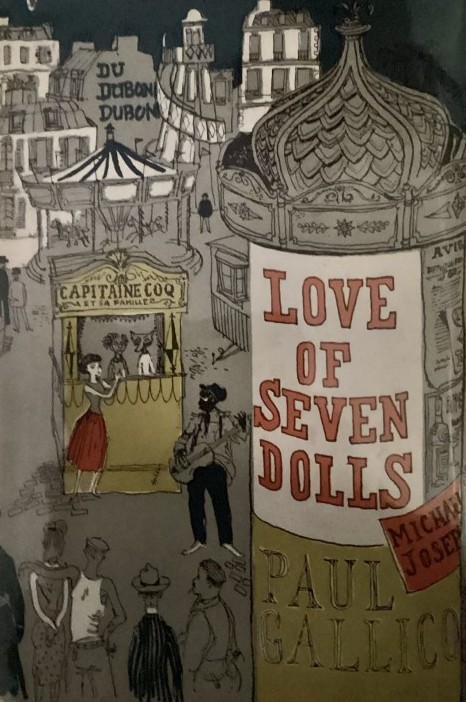Inspiring Older Readers
 posted on 20 Apr 2023
posted on 20 Apr 2023
Love of Seven Dolls by Paul Gallico
I’m not sure why but I’m always a bit reluctant to read Paul Gallico. I have previously reviewed his Adventures of Hiram Holliday (here) but I’ve not explored his work in any detail and I only picked up this novella for peanuts because of the wonderful period jacket. However, my wife read the book and said it was one of the most unusual and idiosyncratic little stories that she’s encountered for a while – so really I felt I just had to take a look for myself. She wasn’t wrong.
In post-war Paris, an orphaned young girl, Marelle Guizec, nicknamed Mouche, is resolved to commit suicide. She’s been fired from her job as a showgirl, she’s near starving and is all alone – there’s nothing she can think of that’s worth living for. As she makes her way towards the Seine, intent on throwing herself in, she’s distracted by a puppet show she stumbles on. A cast of puppet characters begin talking with her as if they have an independent life and she engages with them in conversation, treating each puppet as a living individual. Although she’s not consciously performing, the audience that has gathered around the stall are entranced by the way the young girl talks to the puppets.
Mouche joins the puppet show and begins to tour France with them. It soon becomes clear that with the young girl standing out front and conversing with the puppets, their renown and popularity will lead to more fortune than they have ever experienced before. The girl’s relationship with the puppets – all very different characters in their own right – is treated by Gallico as emotionally significant for all of them: it’s almost as if there is no puppet master manipulating all seven dolls. But there is – Capitaine Coq (real name Michel Payrot) - and he’s an emotionally damaged individual full of contempt and rage when he’s not embodying the puppets. He cruelly mistreats and sexually abuses Mouche, determined to destroy her innocence – but he can’t. The dolls offer the girl solace, understanding and love – revealing the emotional schizophrenia of the puppet-master.
It's not until Capitaine Coq is about to lose his star turn to an acrobat who wants to marry Mouche that he’s able to come out from behind his different guises and accept and acknowledge love.
The whole novella comes across as a strange, mutant fairy tale which is, by turns, disturbing and touching. Gallico expects the reader to accept the idea that this young girl will build deep emotional relationships with the puppets – and it’s written well enough to actually makes us suspend that level of disbelief. Like Mouche herself, the reader finally sees that this puppet show is comprised of the different facets of Michel Peyrot’s character – he can only be considered complete when the personalities of the seven dolls are taken together as representing a single individual.
I suspect that the book is no longer in print but there are hard and paperback copies available on the second hand market for not very much.
Terry Potter
April 2023